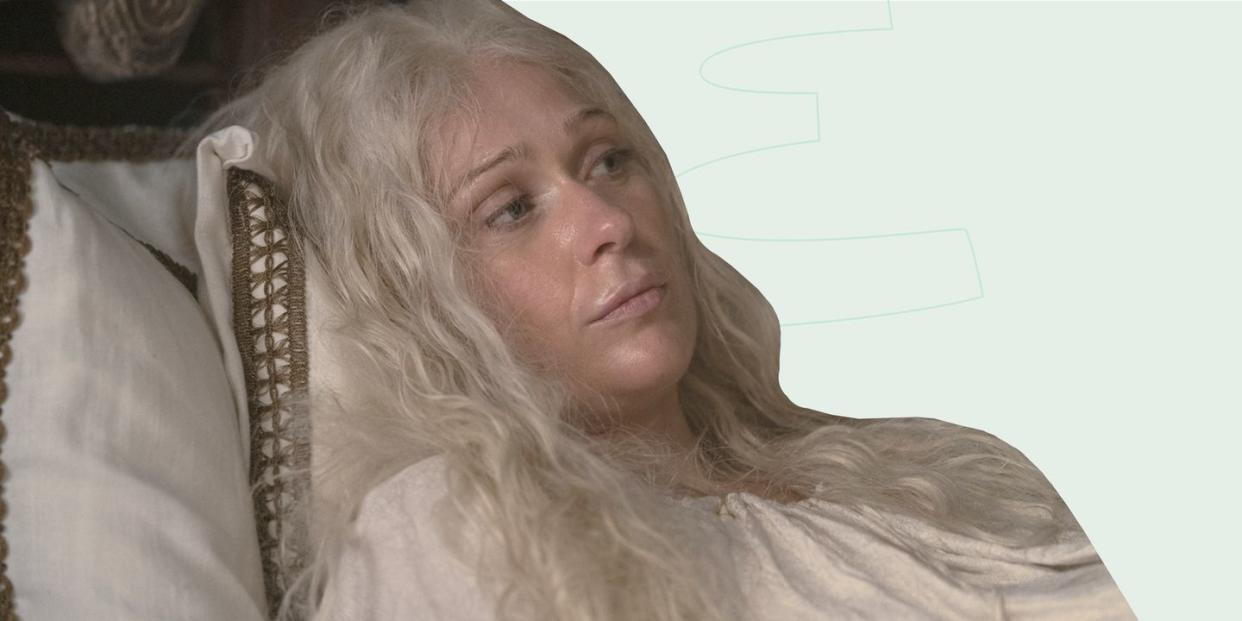Why the 'House of the Dragon' Showrunners Insisted On Episode 1's Bloody Birth Scene

- Oops!Something went wrong.Please try again later.
- Oops!Something went wrong.Please try again later.
Well, that was something! Fans tuning in Sunday night to the premiere of HBO's Game of Thrones prequel, House of the Dragon, were most likely expecting swords, political drama, and giant, fire-breathing dragons. Instead, viewers experienced one of the most disturbing scenes ever put on TV.
"The child bed is our battlefield," Queen Aemma (Sian Brooke) says in the debut episode. Moments later, she goes into labor and has complications. The king in this fantasy series, Viserys (Paddy Considine), is forced to make a decision. He can save his Queen... or save the baby. Desperate for a male heir, he chooses to perform a medieval C-section, and the Queen is murdered.
Thanks to a batch of new interviews from House of the Dragon's showrunners, we have a better idea why, exactly, they felt the gruesome moment needed to make the final cut. "A lot of people had things to say about the birth of Baelon, Prince Baelon,” co-showrunner Ryan J. Condal told Vanity Fair after a visceral reaction from the premiere's theater audience. Blood pours along the sides of the bed, and HBO oh-so-generously intercuts the horrifying affair with scenes of a knight slicing another knight's skull open with one swing of his ax. To make matters worse, the baby only lives for a few hours.
In George R.R. Martin's Fire & Blood—the 2018 novel from which A House of the Dragon takes its inspiration—the birth scene lasts for just one concise sentence. "Queen Aemma was brought to bed in Maegor's Holdfast and died whilst giving birth to the son that Viserys Targaryen had desired for so long," Martin wrote. "The boy (named Baelon, after the king's father) survived her only by a day, leaving king and court bereft."
What audiences watched on Sunday night was much more violent, however, and the brutal scene acts as the catalyst for the entire show. With no male heir and the Queen dead, there are two powerful seats in the realm that are left empty. "That scene is… you don’t want to use the word ‘enjoyable’ for a scene like that, but it’s incredibly powerful," George R.R. Martin told Vanity Fair. “It’s visceral and it’ll rip your heart out and throw it on the floor. It has the kind of impact that the Red Wedding had. It’s a beautifully done scene of something horrible.”
The scene's director, Miguel Sapochnik, felt they had a unique opportunity to comment on the role that women play in Martin's work. Keen to remove images of sexual violence following blowback from the original series, the team decided to move in another direction. "For a woman in medieval times, giving birth was violence. It’s as dangerous as it gets," Sapochnik said in an interview with The Hollywood Reporter. "You have a 50/50 chance of making it. Many women didn’t. If given the choice, the father would choose the child over the mother as a cesarean would kill you. It was an extremely violent part of life."
That said, the birth scene is incredibly difficult to watch—and not everyone at home appreciated the gratuitous amount of blood and screaming. You could also argue that there's a bit of fridging taking place here. If you're unfamiliar, fridging is a trope that sees the traumatizing death of a female character motivate the male character to make a difficult choice, in order to move the plot forward. For critics of the disturbing scene, it probably doesn't help that George R.R. Martin defended complaints that his work often shows gratuitous violence by comparing it to Star Wars. "It always annoys the hell out of me," he told Vanity Fair. "I've been accused of being a particularly bloody person. Star Wars kills more people than I do."
"In the first Star Wars movie... they blow up the planet of Alderaan—20 million people are dead. Does it have any impact on you? Do you care that 20 million people are dead?" he continued. "What would it mean if Viserys was watching the tournament, and a messenger comes running in and says, 'Your wife has died?' Is that going to have any effect on you…? I don't think so."
Maybe not, George! But I wouldn't have had to watch that.
You Might Also Like

